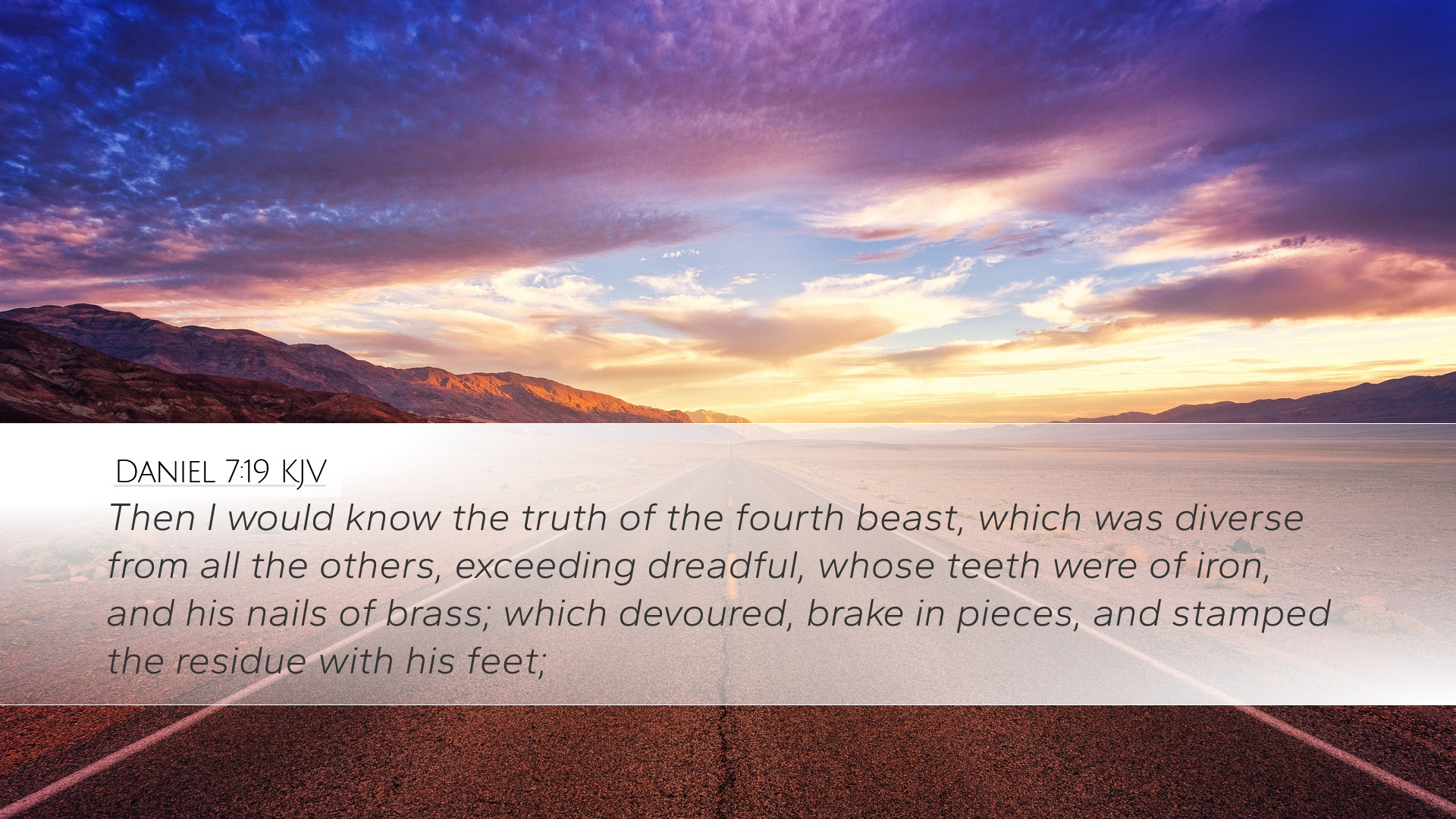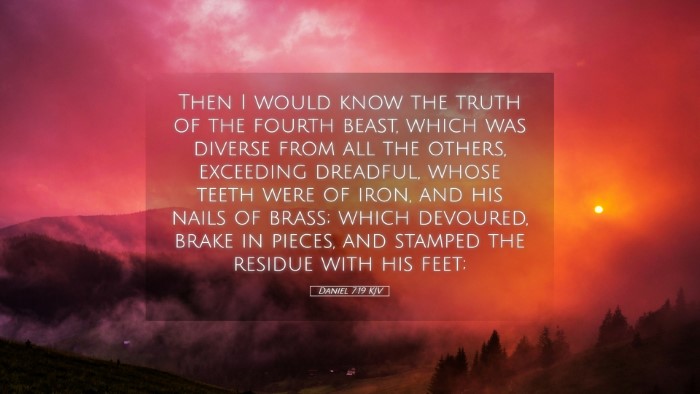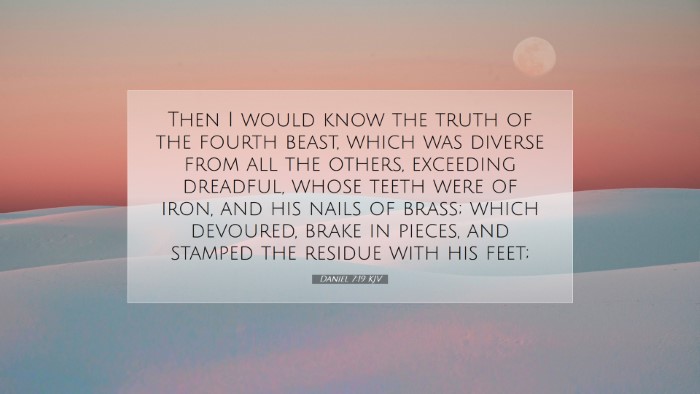Commentary on Daniel 7:19
Verse: "Then I desired to know the truth concerning the fourth beast, which was different from all the others, exceedingly dreadful, with its teeth of iron, and its claws of bronze; and which devoured and broke in pieces and stamped what was left with its feet."
Introduction
The Book of Daniel stands as one of the most enigmatic texts in the Old Testament, brimming with apocalyptic imagery and visions that serve to unveil the divine plan amidst the chaos of human empires. In this particular verse, Daniel's inquiry into the fourth beast signifies not only the importance of understanding prophetic visions but also the theological implications regarding divine sovereignty and judgment.
Contextual Background
The fourth beast in Daniel's vision symbolizes a powerful and unprecedented kingdom that surpasses all previous empires in ferocity and ruthlessness. To comprehend the weight of this verse, one must recognize the historical context and the eschatological implications that the Jewish exiles faced during the Babylonian captivity.
Matthew Henry's Commentary
Matthew Henry observes that the beast represents a dominating worldview that crushes opposition and instills fear. He suggests that the terrifying nature of the beast can be attributed to its capacity for destruction and its relentless pursuit to dominate.
- Terrifying Nature: Henry emphasizes that the “dreadfulness” of the fourth beast conveys the stark realities of geopolitical power struggles.
- Iron Teeth: The iron teeth signify invincibility and the capacity to break all resistance.
- Claws of Bronze: This imagery reflects the beast's ability to seize and consume that which stands in its way.
Albert Barnes' Commentary
Albert Barnes delves deeper into the implications of the fourth beast, suggesting that it symbolizes a unique form of oppression. He notes that this beast is different from others, thereby implying that it represents a culmination of all past tyrannies as well as a peculiar trait of human arrogance.
- Difference from Others: Barnes asserts that the distinctiveness of the fourth beast denotes a new kind of malevolence.
- Destructive Power: He elaborates on the beast’s ability to “devour and break in pieces,” reflecting the chaotic disassembly of societal structures.
- Theological Essence: The inquiry into the nature of the fourth beast serves to remind us of God's ultimate sovereignty over human history.
Adam Clarke's Commentary
In his analysis, Adam Clarke interprets the fourth beast as representing the Roman Empire or the future kingdoms leading to the establishment of God's eternal kingdom. He provides a detailed exposition that integrates historical insights with theological meanings.
- Allegorical Interpretations: Clarke suggests that the beast may also symbolize the spiritual adversaries faced by the faithful throughout history.
- Reflection of Judgment: He points out that the beast's actions—devouring, breaking, and stamping—highlight the serious divine judgment that ensues upon human rebellion.
- Hope Amidst Destruction: Clarke comforts readers with the reminder that despite the prowess of the beast, God reigns supreme and will ultimately triumph over evil.
Theological Implications
Daniel 7:19 resonates deeply with the themes of divine sovereignty, judgment, and the reality of spiritual warfare. The following insights can be drawn for the theological reflection for pastors, students, and scholars:
- Understanding God's Sovereignty: The emphasis on the beast's terrifying nature serves as a reminder that God remains sovereign over all earthly powers, using even chaotic empires to fulfill His divine plans.
- Spiritual Warfare: The vivid imagery echoes the reality of spiritual struggles that believers face in the world today; the battle is not merely against flesh and blood but against oppressive forces.
- Hope and Assurance: Amidst the devastation wrought by the fourth beast, believers are assured of the steadfastness of God’s ultimate plan for redemption and the establishment of His kingdom.
Practical Applications
The practical implications drawn from Daniel 7:19 are manifold, especially focusing on pastoral guidance and personal spirituality.
- Encouragement in Trials: Pastors should encourage congregants to view current adversities through the lens of heavenly realities, fostering resilience and hope.
- Awareness of Oppression: Believers must remain vigilant to the moral and spiritual oppressions around them, engaging actively in both prayer and action.
- Promotion of Peace and Justice: The commentary challenges pastors and church leaders to pursue justice and aid the oppressed, reflecting God's character in their communities.
Conclusion
Daniel 7:19 serves as a pivotal verse that unveils the complexities of human kingdoms in contrast to divine kingship. By integrating insights from classic public domain commentaries, readers gain a holistic understanding of not only the text itself but its implications for faith and practice. The terrifying image of the fourth beast, while daunting, is juxtaposed with the hope of God's ultimate authority—a reminder that in the unfolding of history, God's will prevails above all.


